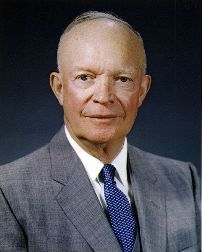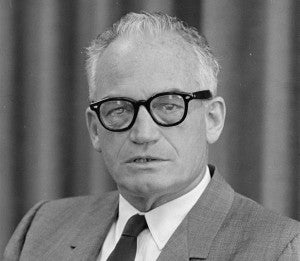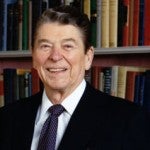Eisenhower, Goldwater, and Reagan on GOP Foreign Policy
Marion Smith /
In an election year dominated by worries about jobs and the economy, it’s easy to forget that the president’s major constitutional concern is supposed to be handling foreign policy. But over the next four years, we can count on events overseas that will demand a response.
How did previous nominees lay out their foreign policy vision? Below are highlights from the nomination acceptance speeches of Dwight D. Eisenhower (1956), Barry Goldwater (1964), and Ronald Reagan (1980) at past GOP conventions.
Dwight D. Eisenhower (San Francisco: August 23, 1956):
President Eisenhower argued that America should have a forward-looking and strategically focused foreign policy that emphasized the need for American respectability and the power of America’s economic and moral influence. Eisenhower, already President, proudly noted America’s enhanced military strength yet cautioned prudence:
We live in a shrunken world, a world in which oceans are crossed in hours, a world in which a single-minded despotism menaces the scattered freedoms of scores of struggling independent nations. To ensure the combined strength of friendly nations is for all of us an elementary matter of self-preservation—as elementary as having a stout militia in the days of the flint-lock. Again, the strength I speak of is not military strength alone. The heart of the collective security principle is the idea of helping other nations to realize their own potentialities—political, economic and military.
The “collective security” of which Eisenhower spoke was not the global governance juggernaut of today: “The strength of the free world lies not in cementing the free world into a second monolithic mass to compete with that of the communists. It lies rather in the unity that comes of the voluntary association of nations which, however diverse, are developing their own capacities and asserting their own national destinies in a world of freedom and of mutual respect.”
Eisenhower’s hopes that the Soviet Union might respond favorably to diplomatic entreaties were disappointed two months later. In October 1956, Soviet tanks rolled through Budapest, Hungary, crushing the attempts of that country to break free of the increasing stranglehold that grasped Central and Eastern Europe.
Barry Goldwater (San Francisco: July 16, 1964):
U.S. Senator Barry Goldwater noted that “a billion persons were cast into Communist captivity and their fate cynically sealed” and named that ideology as the greatest threat to American security. “Communism,” he said, was “the principal disturber of peace in the world today.” Therefore, “communism and the governments it now controls are enemies of every man on earth who is or wants to be free.” Goldwater argued for robust military preparedness and diplomatic resolve, but he also eloquently made the principled case for greater American concern for the fate of freedom beyond our shores and at home.
This Nation and its people are freedom’s model in a searching world. We can be freedom’s missionaries in a doubting world. But, ladies and gentlemen, first we must renew freedom’s mission in our own hearts and in our own homes.
Security from domestic violence, no less than from foreign aggression, is the most elementary and fundamental purpose of any government, and a government that cannot fulfill this purpose is one that cannot long command the loyalty of its citizens.
It is further the cause of Republicanism to remind ourselves, and the world, that only the strong can remain free, that only the strong can keep the peace.
I believe that we must look beyond the defense of freedom today to its extension tomorrow. I believe that the communism which boasts it will bury us will, instead, give way to the forces of freedom. And I can see in the distant and yet recognizable future the outlines of a world worthy of our dedication, our every risk, our every effort, our every sacrifice along the way.
Now I know this freedom is not the fruit of every soil. I know that our own freedom was achieved through centuries, by unremitting efforts of brave and wise men. And I know that the road to freedom is a long and a challenging road. And I know also that some men may walk away from it, that some men resist challenge, accepting the false security of governmental paternalism…. Our Republican cause is to free our people and light the way for liberty throughout the world.
Ronald Reagan (Detroit, Michigan: July 17, 1980):
In his acceptance speech, Ronald Reagan lamented America’s “reduced standing in the world” and pressed for greater military preparedness and closer cooperation with allies, in order to bolster the effectiveness of American diplomacy. Reagan argued that to “renew our compact of freedom,” Americans must recommit themselves to international leadership in the cause of freedom, first through example but also through the prudent use of U.S. foreign policy tools, including diplomatic, military, and economic pressure.
Who does not feel a growing sense of unease as our allies, facing repeated instances of an amateurish and confused administration, reluctantly conclude that America is unwilling or unable to fulfill its obligations as the leader of the free world?
The basis of a firm and principled foreign policy is one that takes the world as it is and seeks to change it by leadership and example; not by harangue, harassment or wishful thinking. The time is now to say that while we shall seek new friendships and expand and improve others, we shall not do so by breaking our word or casting aside old friends and allies.
Adversaries large and small test our will and seek to confound our resolve, but we are given weakness when we need strength; vacillation when the times demand firmness. The Carter Administration lives in the world of make-believe. Every day, drawing up a response to that day’s problems, troubles, regardless of what happened yesterday and what will happen tomorrow. The rest of us, however, live in the real world. It is here that disasters are overtaking our nation without any real response from Washington.
America’s role in the world today should build upon the best of the United States’ foreign policy traditions. After all, as Eisenhower put it, “Change based on principle is progress. Constant change without principle becomes chaos.” U.S. foreign policy has guiding principles: Our leaders need to make clear that these principles are understood and appreciated.



